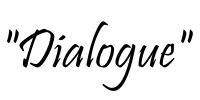Writing Dialogue · 12 August 2017

Dialogue is one of the toughest things to write. And one of the most fun.
I have not been writing fiction for too long, but so far, dialogue is by far the toughest part of the story. I would personally write with no dialogue at all, except it is one of the best parts of a story. At least when it is done correctly.
They (whoever they are) say that the best way to write dialogue is to listen. Eavesdropping is one of the best methods to learn how to write dialogue experts say. I do that all the time during the school year. I hear students talk. And talk. And talk. But that is not necessarily the best eavesdropping since I set some of the ground rules. At least about some of the words they cannot use. And dialogue in an academic setting is not always the best anyway.
“Hey, what’d you get for the second problem?”
“None of your bee’s wax, Bozo.”
“That’s twenty-five pushups for putting people down.”
“But Bozo’s his name.”
“Oh yeah.”
I also like to listen in on conversations by other adults. Unfortunately, that eavesdropping is usually listening on other educators. Acronyms and jargon abound. And I hear talk like you might hear when parents speak about their own kids. Mushy and gushy and sometimes chastising.
So for the most part, I do not hear dialogue I would put into a book or story. It is all too juvenile or academic in nature.
Besides, you cannot really listen to see how dialogue is done when you are part of the dialogue. It is like observing yourself. Heisenberg’s uncertainty principle says that you can either know a particle’s speed or know its location, but not both at the same instant in time. While it is mainly a quantum mechanics truism, it also holds true for people. You cannot observe yourself or others without altering your own (or their) behavior. At least if they know you are observing. Since you are yourself, you cannot observe yourself without altering your own behavior because you always observe yourself whether you know you are observing or not.
I heard it explained this way. Think about which shoe you put on first. The left or the right or whichever shoe you grab first. If you do not know, you cannot really find out by observing yourself because as soon as you start observing yourself, you change your own behavior. You might even talk to yourself.
“I don’t want to be a left foot first person. So I’ll grab my right shoe first and put it on.”
“Oh darn! I put my left shoe on first.”
“But if I see myself put my left shoe on first, does that mean I saw myself or changed my behavior by observing myself?”
“Quit watching! You’ll change my behavior.”
“Who said that?”
And so it could go on and on and on and on until you finally could not put on any shoe, and you miss work because you caught yourself observing yourself putting on the wrong shoe first. Which just goes to show that you cannot really observe yourself in conversation because you might start using correct grammar and pronounce words correctly and enunciate precisely and actually wait for the other person to finish a thought before interjecting your own opinions on the matter at hand. In short, if you observe yourself, you will change your own behavior. Even in conversation. Of course, you could just listen and never talk, but people would get annoyed that you never said anything.
“That’s just because I’m trying to learn dialogue,” you might think but never say. After all, you do not want to change your own dialogue by observing your own dialogue. Or by letting others know you are observing theirs.
Which is why dialogue is so difficult. Even if you just like to hang out where people are hanging out and listen to their conversations. Just be careful about who you eavesdrop on. They might not like you eavesdropping and possibly changing their behavior.
“So like I said, writing dialogue is tough.”
“Hey! Is that guy eavesdropping in on us?”
“Yeah! He is.”
“Why I ought to…”
“Not with a preposition.”
“Huh?”
“You ought to do something, but not end a sentence with a preposition.”
“Yeah right.” Pause. “Oh no.”
“What’s wrong.”
“He changed my dialogue by eavesdropping.”
“Oh. That’s too bad. See, I told you writing dialogue was tough. But he really did not change your dialogue directly. He changed your dialogue because you know he was eavesdropping which changed your behavior.”
“Yeah. That Heisenberg dude again.”
“Yeah. Even though it’s not rocket science or quantum mechanics.”
“You’re right. Dialogue’s tough.”
“Real tough.”
“He’s still listening to us!”
© 2017 Michael T. Miyoshi
| Share on facebook | Tweet |

|
Comment
Commenting is closed for this article.
| Just Keep Writing | Total Eclipse of the Sun |










